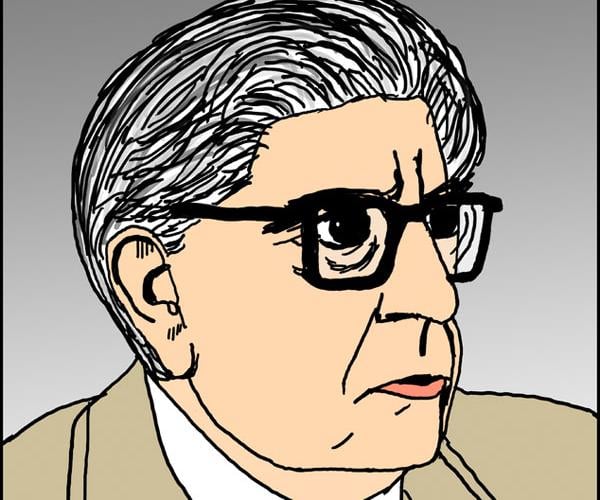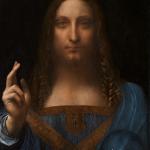Ernst Bloch was a Marxist–indeed, a Stalinist–who believed that Christianity is the inspiration for the Revolution. He was an atheist who loved the Bible. A materialist who venerated Jesus. He believed that the Bible liberates us from God, that Jesus is the model atheist. Bloch once said that “only an atheist can be a good Christian; and only a Christian can be a good atheist.”
Bloch was wrong and wrong-headed about virtually everything. But he was extremely influential on a group of prominent liberal theologians. And he helps explain the curious religious zeal of progressives and leftists.
Matthew Rose has written a fascinating article on Bloch for First Things. I urge you to read the whole thing, but here is a sample from Our Secular Theodicy:
Bloch was an atheist who believed Jesus was the Messiah, a Stalinist who disagreed with Marx, and a materialist who embraced natural law theory. For the moment you will have to take my word that this can make sense and that it is worth the modest effort to understand how. You would be within your rights to be skeptical. No doctrine has been refuted so often as Marxism, and the debates that consumed Bloch’s long life are dead. Yet the utopian spirit to which he gave original, sometimes brilliant, and more often bizarre expression has never been more alive, and to visit his work is to witness a moment when Christian faith began to transmute itself into the progressive creeds of today.
In a series of books beginning in 1918 and ending shortly before his death in 1977, Bloch proposed that the central category for understanding politics is eschatology—our anticipation of a future society that will reveal the meaning of human history and redeem its fallen state. He named this kingdom “utopia” and argued that its arrival is the object of every human hope and the justification of every human suffering. Bloch lived under Hitler, Vichy, and the gaze of Walter Ulbricht, the Stalinist leader of East Germany, making his work an anguished commentary on the darkest moments of the twentieth century. But his millennial hopes, expressed in critical dialogue with Christian theology, continue to inspire many.
Bloch is a guide into the concealed theology of contemporary liberalism, whose outlook remains profoundly, if paradoxically, biblical in one respect. Having rejected a Christian understanding of nature, it retains an intensely Christian understanding of history. It sees human history as goal-oriented and our advancement as a series of conversions and liberations, the outcome of which is the creation of a community that can redeem our fallen history. Bloch appreciated, as deeply as any modern thinker, that this is not a secular understanding of time. It is a biblical story, told in the misleading language of progressive politics. But how can history have a moral direction at all? And how did Christianity come to be placed on the wrong side of it? Bloch offers a fascinating explanation of this theological reversal, showing us how a politics Christian in origin could become anti-Christian in intention.
Not only did the Bible give human beings a linear view of time that culminates in an eschatological fulfillment, Bloch said that the Bible taught human beings to oppose every kind of oppression, including eventually the oppression of God. Jesus, he said, was not God become man; rather, he was man who made himself God. He did so by purposefully fulfilling in his own life the requirements for the Biblical apocalypse. Thus, Jesus becomes the model both for atheism and for revolutionary action.
Rose says that Bloch offers secularists a “theodicy.” Religious believers practice “theodicy” when they offer explanations as to why a just and all-powerful God allows evil and suffering in the world. But if you don’t believe in God, the necessity of a theodicy is even greater. Why is material reality so full of evil and suffering? Existence itself must be horrible. Bloch’s doctrine of “hope” is one way for a non-believer to justify existence. If life is progressing, if history is becoming more and more just, if all the pain and injustice is building to a utopia in which every tear shall be dried, and if we all have a part to play by anticipating this eschatological hope in our own lives, then life has meaning and value after all.
Bloch, as they say, explains a lot. I have long wondered how liberal theologians can be so flat-out unbelieving of every orthodox Christian teaching and yet retain a certain commitment to Christian language and worship. I have marveled at the way liberal theologians who don’t believe a word of the Bible nevertheless often employ the Word of God in the service of their radical leftwing politics. I have wondered why some liberal theologians do so much with “hope” and “eschatology,” even though they don’t believe Jesus is coming back. Bloch was influential with liberation theologians as well as more moderate theologians such as Pannenberg and Moltmann. At one time, he was a colleague of Joseph Ratzinger, who would become Pope Benedict XVI and who thanked Bloch for restoring history to the concept of salvation.
And yet, if there is a God, if God did become man in Jesus, if the eschaton is Christ’s return, the resurrection of the dead, and the life everlasting, then all of Bloch’s theories and politics come unravelled. And if he were honest about the pain and suffering and oppression caused by Stalin and his other totalitarian revolutionaries, he might understand the Bible’s view of history, with its conflict between human sin and God’s grace, with greater accuracy.














